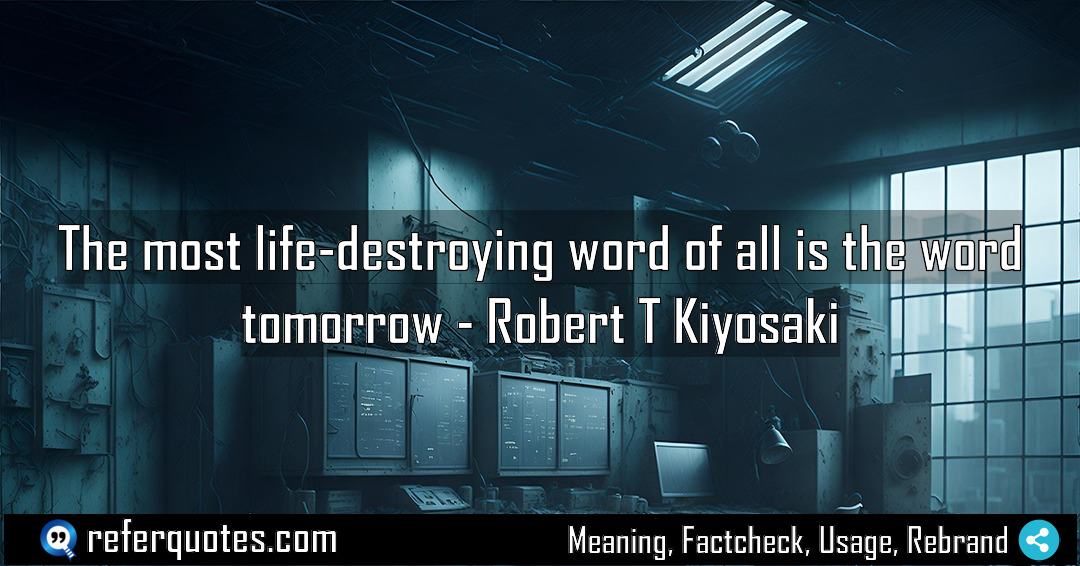
“The most life-destroying word…” is a powerful gut-check. It’s not about time management; it’s about the quiet cost of inaction.
Share Image Quote:
Table of Contents
Meaning
At its core, this quote means that delaying action on your goals and dreams is a form of self-sabotage that erodes your potential, day by day.
Explanation
Look, I’ve seen this play out so many times. The word “tomorrow” isn’t just a date on the calendar. It’s a psychological trap. It’s the permission slip we give ourselves to avoid the discomfort of today—the hard work, the difficult conversation, the financial risk. And the real destruction isn’t dramatic. It’s the slow, quiet accumulation of regret. It’s the compound interest on missed opportunities. You wake up one day and realize that your “tomorrows” have stacked up into years of a life you didn’t really design. It’s not just procrastination; it’s a deferral of life itself.
Quote Summary
Reading Level55
Aesthetic Score72
Origin & Factcheck
This line comes straight from Robert Kiyosaki’s 1997 personal finance classic, Rich Dad Poor Dad. It’s a cornerstone of the book’s philosophy. You’ll sometimes see this sentiment attributed to others, like Napoleon Hill, but the specific phrasing “the most life-destroying word” is definitively Kiyosaki’s.
Attribution Summary
Author Bio
Born in Hilo, Hawaii, Robert T. Kiyosaki graduated from the United States Merchant Marine Academy and served as a Marine Corps helicopter gunship pilot in Vietnam. After stints at Xerox and entrepreneurial ventures, he turned to financial education, co-authoring Rich Dad Poor Dad in 1997 and launching the Rich Dad brand. He invests in real estate and commodities and hosts the Rich Dad Radio Show. The Robert T. Kiyosaki book list spans personal finance classics like Cashflow Quadrant and Rich Dad’s Guide to Investing, along with educational games and seminars.
| Official Website | Facebook | X| Instagram | YouTube
Where is this quotation located?
| Quotation | The most life-destroying word of all is the word tomorrow |
| Book Details | Publication Year/Date: 1997; ISBN/Unique Identifier: 978-1612680194; Last edition: 2022 Revised Edition, Number of pages: 336 |
| Where is it? | Chapter 8: Getting Started, Approximate page from 2022 edition: 259 |
Context
In the book, this isn’t just abstract advice. Kiyosaki places it in the context of financial education and building assets. His “Rich Dad” uses this idea to hammer home why waiting to invest, or waiting to start a business, or waiting to learn about money, is a recipe for staying in the “Rat Race.” It’s the antidote to the “I’ll start when I have more money/time” excuse.
Usage Examples
You can use this as a powerful conversational tool. For instance, when a team member says, “We can pivot the marketing strategy tomorrow,” you can gently ask, “Is that a strategic delay, or are we falling for the ‘life-destroying tomorrow’?” It reframes the conversation from schedule to consequence.
Who needs to hear this? Honestly, almost everyone. But especially:
- The Perpetual Planner: The person who is always “getting ready to get ready.”
- The Fearful Employee: Someone who stays in a dead-end job, dreaming of a side hustle they never start.
- The Aspiring Investor: The one waiting for the “perfect time” to enter the market, which never comes.
To whom it appeals?
Share This Quote Image & Motivate
Motivation Score82
Popularity Score80
Shareability Score80
Common Questions
Question: Isn’t this quote just promoting reckless impulsivity?
Answer: That’s a great question, and it’s a common misinterpretation. No, it’s not about being reckless. It’s about bias towards action. It’s about taking that first small, calculated step *today* instead of waiting for a mythical, perfectly safe tomorrow that may never arrive. Planning is essential, but it must be in service of action, not a substitute for it.
Question: What’s the difference between “tomorrow” and sensible patience?
Answer: Patience is about enduring the process *after* you’ve started. “Tomorrow” is about never starting at all. It’s the difference between patiently nurturing a growing business and patiently waiting for a “sign” to launch it. One is active; the other is passive.
Question: How do I stop using the word “tomorrow”?
Answer: You don’t have to eliminate the word from your vocabulary. The trick is to catch yourself when you use it as an excuse. The moment you hear yourself say “I’ll do it tomorrow,” ask: “What is the *one small thing* I can do to move this forward in the next 24 hours?” That shifts the focus from a vague future to a concrete present.
Similar Quotes
You know, that idea that “Your current thoughts are creating your future life” is more than just a feel-good quote. It’s a fundamental principle of how our focus shapes our…
You know, it’s wild how often we destroy the things we love most out of fear. It’s a painful paradox that shows up everywhere, from boardrooms to bedrooms. Let’s break…
Our life is what our thoughts make it… a simple but profound truth that’s been a game-changer in how I approach both challenges and opportunities. Table of Contents Meaning Explanation…
Life truly is what we make it is a powerful reminder that our attitude and actions are the ultimate architects of our reality. It’s not about what happens to you,…
Remember, today is the tomorrow you worried about yesterday. It’s a simple but powerful reminder that most of our anxieties are about a future that never actually arrives. Let’s break…
